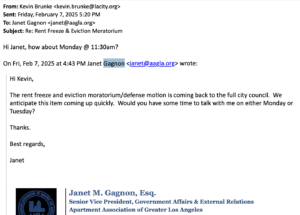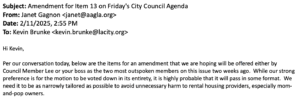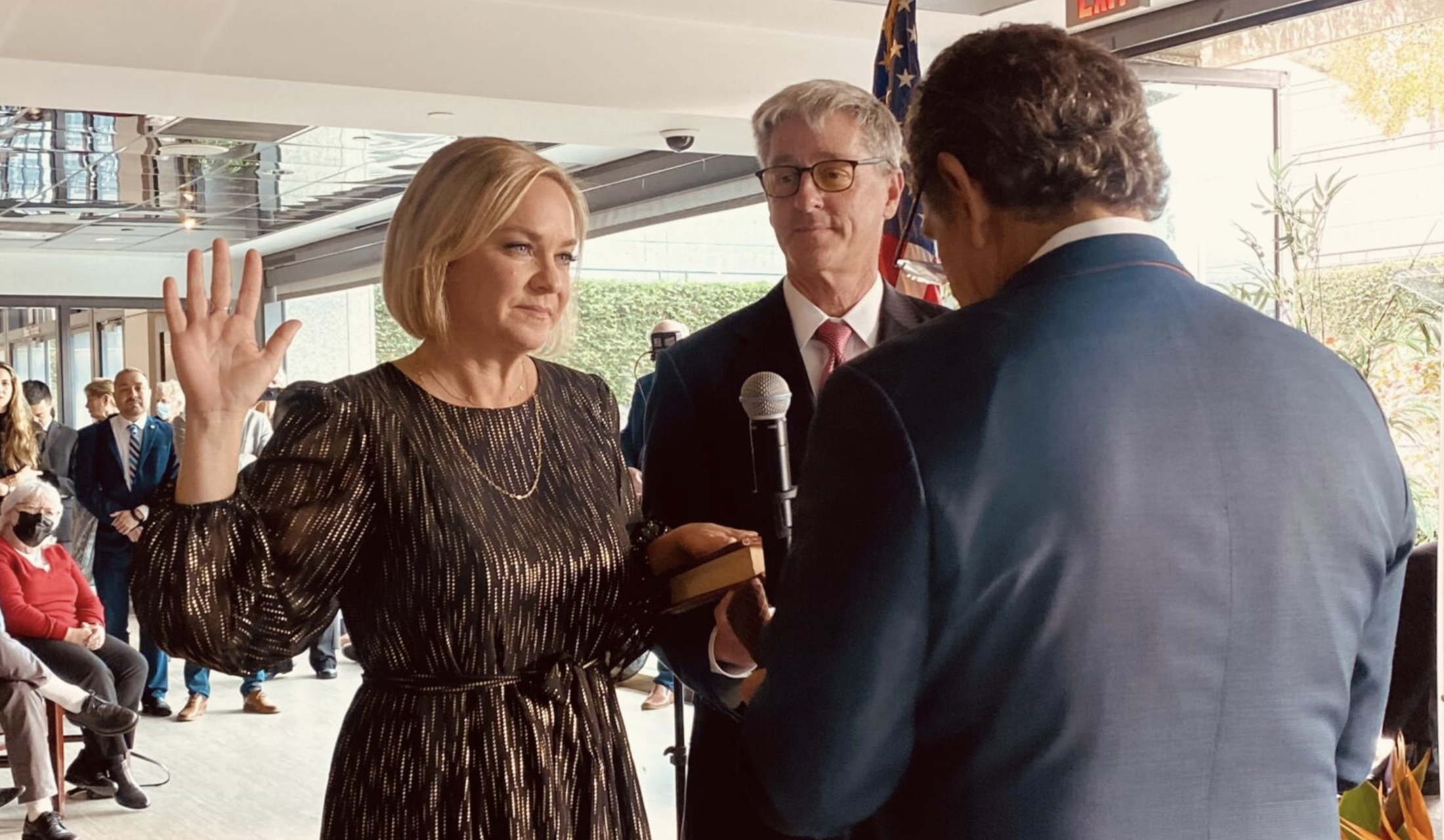In early 2025, as Los Angeles was reeling from a wave of devastating wildfires, City Councilmembers introduced a motion to enact emergency tenant protections. The proposal included a temporary eviction moratorium and rent freeze in impacted areas. But behind the scenes, Councilmember Traci Park’s office was quietly coordinating with one of the most powerful landlord lobbying groups in California to stop it.
A trove of emails released through a public records request reveals a pattern of direct access, private meetings, and shared strategy between Park’s senior staff and the Apartment Association of Greater Los Angeles, an organization fiercely opposed to tenant protections.
The communications show that Park’s staff worked closely with the Apartment Association to undermine the proposed moratorium, adopt talking points aligned with the landlord lobby, and water down key provisions in favor of property owners. These revelations raise serious concerns about Park’s independence and her office’s alignment with special interests, particularly as thousands of renters in her Westside district struggle to remain housed.
 On February 7, 2025, just days before the City Council was set to vote on the wildfire tenant protections, the Apartment Association’s senior vice president Janet Gagnon emailed Park’s senior legislative deputy Kevin Brunke requesting a one-on-one meeting. She asked whether he had time to talk on either Monday or Tuesday. Brunke replied promptly and scheduled a Zoom meeting for February 10. When Brunke was late to the original call, Gagnon offered to reschedule, and the meeting was reset for the next morning. She wrote that she would send an updated calendar invitation for 9:00am.
On February 7, 2025, just days before the City Council was set to vote on the wildfire tenant protections, the Apartment Association’s senior vice president Janet Gagnon emailed Park’s senior legislative deputy Kevin Brunke requesting a one-on-one meeting. She asked whether he had time to talk on either Monday or Tuesday. Brunke replied promptly and scheduled a Zoom meeting for February 10. When Brunke was late to the original call, Gagnon offered to reschedule, and the meeting was reset for the next morning. She wrote that she would send an updated calendar invitation for 9:00am.
This level of direct and immediate access stands in stark contrast to how tenant groups often struggle to secure meetings with elected officials. There is no evidence in the email records of Park’s staff offering similar availability to tenant advocates.
The emails also show Park’s office regularly receiving bullet points, policy suggestions, and press coverage from landlord allies. In one instance, a CityWatch article praising Park as the only councilmember with common sense and real leadership abilities was circulated among landlord activists, including the Apartment Association’s director and Park’s office.
Meanwhile, the Apartment Association used Park’s alternative legislative proposals to their advantage. Instead of supporting the citywide rent freeze and eviction moratorium, Park introduced a narrower motion that allowed displaced tenants to temporarily house additional family members and pets. The Apartment Association touted this as a better solution, calling the broader protections unnecessary and overly punitive toward landlords.
 In multiple emails, Park’s staff received feedback from the Apartment Association requesting specific amendments, including shortening the duration of the eviction moratorium, excluding pending evictions, and allowing owner move-in evictions to proceed. Park ultimately supported many of these changes during Council debate while voting against stronger tenant protections proposed by her colleagues.
In multiple emails, Park’s staff received feedback from the Apartment Association requesting specific amendments, including shortening the duration of the eviction moratorium, excluding pending evictions, and allowing owner move-in evictions to proceed. Park ultimately supported many of these changes during Council debate while voting against stronger tenant protections proposed by her colleagues.
As LA County introduced its own wildfire tenant protections in late February 2025, landlord lobbyists seized the opportunity to argue that the City of LA should now drop its proposal altogether.
Michael Millman, a longtime landlord lobbyist and attorney, emailed Park’s chief of staff Andrea Conant on February 25 writing that there was no need to calendar a hearing for a similar law proposed by a few tenant friendly Council Members and that the matter for March 4 should be removed from the calendar.

Park’s office was included in an email thread with Millman, the Apartment Association’s director Daniel Yukelson, and other industry representatives. Shortly after, the most aggressive tenant protections were indeed tabled. The emails reveal a coordinated strategy between Park’s office and landlord groups to use the County ordinance as political cover for City inaction.
These emails are consistent with Park’s broader voting record and campaign backing. Since taking office, she has voted against a one-month grace period before evictions, opposed capping rent increases on rent-stabilized units at four to six percent, and opposed requiring landlords to pay relocation assistance after raising rents more than ten percent. In early 2023, she was one of just two councilmembers to vote against the city’s eviction threshold ordinance, which bars landlords from evicting tenants who owe less than one month’s fair market rent.
During the 2022 campaign, Park received over $1.2 million in support from landlord and real estate interests. That included over half a million dollars from Douglas Emmett Inc. via an independent expenditure and over $250,000 from the California Apartment Association.
The pattern is clear. Traci Park and her staff maintained a close and active relationship with the landlord lobby while opposing meaningful tenant protections at nearly every turn. While Angelenos directly affected by the fires were calling for emergency measures to avoid displacement, Park’s office was holding Zoom calls with the Apartment Association, receiving talking points, and adopting their policy framework.
These emails show more than just influence – they show coordination with a councilmember whose policymaking process appears to be shaped by private conversations with landlords and lobbyists rather than the lived experiences of renters on the Westside.

